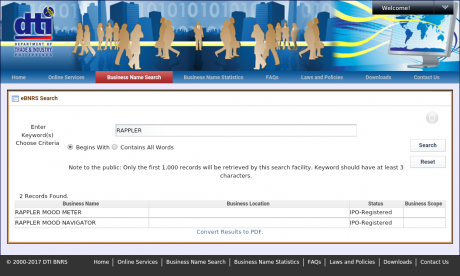
OVERVIEW
The embattled website Rappler.com have been through many issues and controversies since the dawn of the Duterte administration in the Philippines, alleged of misquoting the President, using fake photos, publishing fake news and propaganda, using questionable graphs and data, and putting various bloggers and netizens under bad light. In return, the President himself occasionally pans the website and its authors for their content. Netizen supporters of Duterte even went as far as delving into the nature of the organization behind it. But what really is Rappler? Since the second half of 2017, the dilemma of whether Rappler is a news outlet or a blogging platform has been further blurred by the website when it launched its crowdfunding campaign and Lazada merchandise store.
‘Dissecting Rappler’ explores the true nature of the website called Rappler that labels itself a “social journalism platform.”
LEGALITY
Using the DTI eBNRS, we performed a search for all records of “Rappler” in the Department of Trade and Industry business registry. The screenshot below is the result of that search:

Upon searching for the keyword, “Rappler”, two results appeared:
- RAPPLER MOOD METER
- RAPPLER MOOD NAVIGATOR
Both were “IPO-registered”, indicating that these two items are patents as opposed to “DTI-registered” if it is a business name.
Now, apparently, aside from the two patents, there are no DTI records that shows Rappler has been permitted to sell their self-branded merchandise online and to publish the advertisements of others on their website’s pages.
Normally, DTI-registered business websites will include the DTI permit number and series number on their About/Info section.
This isn’t the case for Rappler.com.
On their ‘Xchange’ page where their Online Merchndise Store is displayed, there is no About section included:
Their ‘Advertise with us!’ page also did not provide any info about the legality of their Marketing services:
For all Sales & Marketing concerns and queries, you may contact us via the following methods:Email: sales@rappler.comTelephone: +632 6619983 to 85Fax: +632 576 3931
The page:
has been published on July 2, 2012 and last updated on August 16, 2013. This means Rappler have been engaging on non-DTI registered Marketing business for almost five years, presumably evading all taxes along the way.
In addition to their bogus buiness and merchandise setup, Rappler’s Job Opening page also does not specify that they have been permitted by Department of Labor and Employment (DOLE) to hire and employ people:
Perhaps, the most interesting and controversial part of the Rappler website yet is their recently launched Crowdfunding program:
“Rappler Crowdfunding : Frequently Asked Questions”
“Rappler Crowdfunding: Terms and Conditions”
“Collaboration Powered By Social Media”
1. Rewards-based crowdfundingIn return for the money given to a project, a business or non-profit venture typically gives some type of incentive or reward to the participating crowd.A good example is the smart watch Pebble, which made the tech industry take notice when it received over $2.6 million in only three days of active crowdfunding.The top players in this type of crowdfunding are Kickstarter and Indiegogo.
2. Equity-based crowdfundingInnvestors fund small businesses in return for equity.If the project succeeds, the shares increase in value. The opposite is equally true. Equity-based crowdfunding has the greatest potential with startup businesses that are seeking smaller investments to achieve establishment.The top players in this kind of crowdfunding are AngelList, CircleUp, FundersClub and OurCrowd.
3. Credit-based crowdfundingThis type of crowdfunding basically comes from non-banks and individuals who support a project. It became popular in 2012 when banks increased interest rates and reduced their level of lending activity.Individuals or businesses lend money to support an idea or project in return for interest payments. Borrowers must demonstrate the capability to repay the debt, making it unattractive to startups.The more popular credit-based crowdfunding are Prosper.com, which funded nearly $325 million in loans by April 2012, and the Lending Club, which advanced more than $500 million in loans via its website by April 2012.
Now, Rappler seem to not fall into any of these three types based on their FAQs and TACs, as their format seems more like a donation maslabeled as crowdfunding.
The closest category will be rewards-based CF, as the donor will be receiving an optional monthly report in return. This, however, doesn’t seem like a real reward or incentive.
Atty. Francis Lim further stated that “since crowdfunding necessarily involves fundraising from the public, our Securities Regulation Code (SRC) requires approval from our Securities and Exchange Commission (SEC)”
Again, Rappler failed to specify on theur website if their crowdfunding has been permitted by SEC.
To make things more complicated, Rappler’s crowdfunding TAC stated that
Contributions received by Rappler will be deposited in one or more bank accounts in the name of Rappler together with other Rappler funds. Each contribution will be identifiable by a unique merchant identification number and accounted for separately by Rappler.
They are saving their collected funds into merchant accounts. This makes their fund circulable in business, beyond its surface function that is for project start-ups and charitable causes. Rappler’s crowdfunding format makes its collected fund easily bypassable. Their FAQ states clearly that updates about their projects are “optional”. There is already a lapse in transparency here.
Normally, a crowdfunding campaign online will:
1. Define the goal of the project, its name, its purpose and benefits
2. Provide a certain goal amount based on an estimation of budget that will be used for the defined project
3. Ensure transparency between the investors/donors and the recipient, typically mediated by a lawyer and a contract
On Rappler’s case, however, they are merely collecting money for “future projects”. There is no assurance that the fund, in whole or in part, will be used for start-up projects or not.
The possibility that Rappler is committing a fraud and exploiting the lack of regulations for crowdfunding is reinforced by the fact that their crowdfunding lacks SEC permit and their “optional” transparency to their donors.
Some controversies, however, links Rappler to their alleged financier George Soros, a “philantrophist” with a rather shady reputation, and that their crowdfunding and merchandising were merely fronts to cloak the money flow.
Nevertheless, what we wanted and what everyone should want is for DTI and SEC to investigate Rappler if their online businesses are registered and legal. We want to know if their ad Marketing is legal. We want DOLE to confirm if Rappler is permitted to employ people. We want Bureau of Internal Revenue to investigate them for highly-possible tax evasion violations.
LITMUS TEST
So, is Rappler a news outlet, or not? To answer that, let us list some of the basic elements of traditional news publishing:
1. Printed Press.
Rappler does not have a printed press and have directly started as an online “news” website. It means they have bypassed all other news outlets that have gone through rhw tests and challenges of printed media, of extensive editorials and copy editing to ensure that the final output will be as error-free as possible, as the ink on paper cannot be edited once published.
Many people are irked then with Rappler’s amateurism and irresponsibility as their online and editable platform gives them the opportunity to publish questionable contents and edit it anytime with ease.
Further, most news outlets unlike Rappler are registered to DTI as printing and publishing businesses.
2. Cross-Platform.
Traditional news will usually exert efforts to distribute their news tp wider audience as possible, so they expand into the radio and television in addition to printed press. Rappler, however, in their half a decade run or so, never showed any effort or interest for expanding their reach towards other media, opting to stay on the web.
3. Sponsorship.
Traditional media will normally have long-time partners with companies whom will serve as their sponsor and whose products will be a staple feature in their ads. This is an indication of commitment for the news outlet. That the outlet can be trusted and has loyalty by staying on the course of their contract.
Rappler, on the other hand, does not have any big sponsors at all, meaning they are not attracting the attention of business players.
BLOG OR NOT
Many are misled to assume that Rappler pioneered the idea of “social journalism”. In reality, they didn’t. Twitter did.
In response to the pain of fitting thoughts into 140-character posts, they created Medium, the first true social journalism platform.
For a service to be a social journalism, it must be accessible by the public, all registered members should be equal and has the ability to publish articles. Rappler does not allow registration of users, does not allow publication of articles by users and comments submitted by users are even filtered to show only what the author wanted to show, as opposed to the idea of social journalism where there is a social interaction between the writer and the reader.
Rappler’s web-only nature, their ad format that is similar to how blogs publish advertisements, plus the overall subjectivity of its malprofessional authors all make it apparent that Rappler only a blogsite masquerading as news outlet in an attempt to rise above the competition in the blogosphere.
In a way, Rappler doesn’t differ from satire and parody websites that also present themselves as news outlets only to serve hilariously shallow content.
SUMMARY
Perhaps, the keyword for Rappler is “confusion.”
It confuses itself as a news outlet while being a blog and a merchandise store and a crowdfunding website.
It confuses their readers with misleading data and constantly edited content.
It uses a color pallette of confused hues that ranges between orange and red and brown.
Even their name itself is confusing. Rappler is supposedly a portmanteau of “rap” and “ripple” but it didn’t come out as “rapple”. Where did the extra “r” come from?
It popped out of nowhere, like all the manufactroversies and fake news that Rappler has invented.
No comments:
Post a Comment